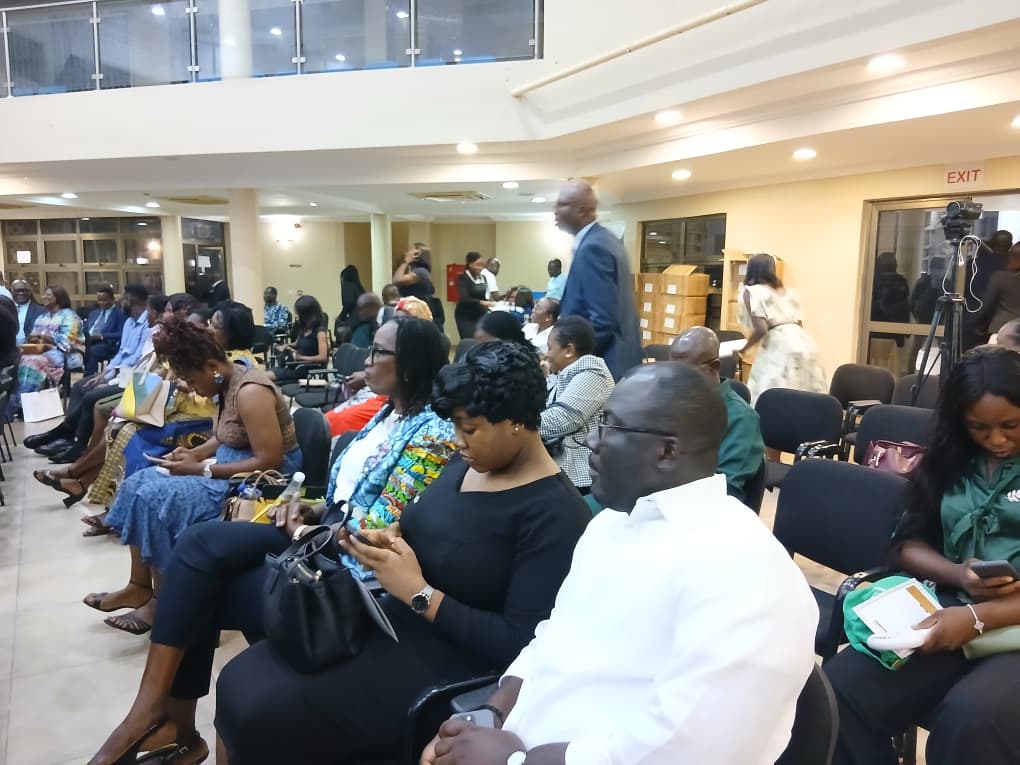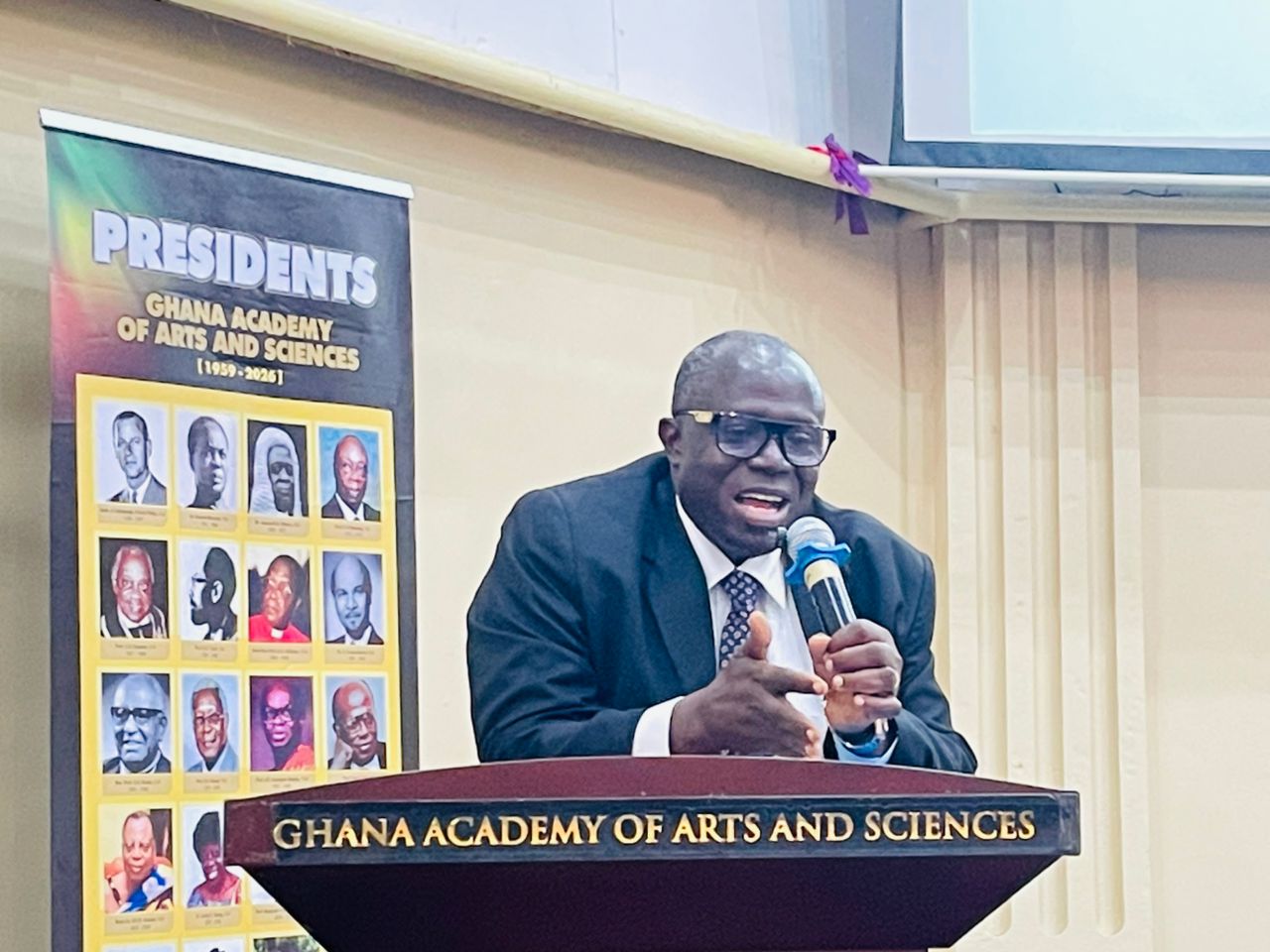A Justice of the Supreme Court of Ghana, Sir Justice Dennis Dominic Adjei, has launched a comprehensive 968-page book titled “International Human and Peoples’ Rights, Law and Practice”, a monumental scholarly work that explores the global architecture of human rights law and its implications for judicial practice in Africa.
The book, which spans 20 chapters, also includes analyses of landmark international human rights cases, general comments from treaty bodies, and the evolution of generational rights — from civil and political rights to social, economic, environmental, and collective rights.
Speaking during the launch, at the Auditorium of the Ghana Academy of Arts and Sciences on Friday, October 10, 2025, the distinguished Justice, who is also a judge of the African Court on Human and Peoples’ Rights, said he was inspired to write the book out of a deep desire to bridge the existing gap between theory and practice in international human rights jurisprudence.
“I wrote this book for several reasons. The first reason is that I have moved throughout the world. Wherever I go — library or bookshop — you see literature on the African courts, the African Commission, the Inter-American courts and Commission, and the European courts on human rights.
“Then you see literature on the International Criminal Court and the International Court of Justice. But you never get the fight together,” he said.
Vantage experience
Justice Adjei explained that his experience as a judge of the African Court gave him a rare vantage point to synthesize the practices of the major international human rights courts.
“Every year, the three international courts — the African Court, Inter-American Court, and European Court — meet.
“This year, we are meeting on the 4th, 5th, and 6th in Tanzania. So I take advantage. And at the ICC, I served on the advisory committee.
“So whenever I was there, I visited the courtroom, I looked at the rules, and I saw that I have the right for people to publish it,” he further indicated.
He went on to highlight the importance of understanding the relationship between national constitutions and international treaties. He emphasized that once a state signs a human rights treaty, it is legally bound to align its domestic laws with the provisions of that treaty.
“Nobody forces a country to go and sign a treaty. And once you sign a treaty, you subordinate your constitution to the treaty. So if there are violations, they shall order you to go and align,” he added.
Conceptual distinctions
The eminent jurist took time to clarify the conceptual distinctions between human rights and peoples’ rights, noting that the African Charter on Human and Peoples’ Rights uniquely recognizes both. “Human rights belong to you as a person — your right to life and all of that,” he explained.
“But when we talk about people’s rights, they belong to the community. That is why we have human and people’s rights. Human means it belongs to you specifically, but people’s means it belongs to the community.”
Justice Adjei also provided insights into how the African Court addresses cases involving violations of rights. “When you are here, you don’t bring the action against the Supreme Court; you bring it against the country. So we handle cases against whole countries for acts committed by their apex courts,” he added.
He used examples from international judgments to illustrate how treaty interpretation and enforcement often go beyond domestic legal reasoning. He cited a recent decision by the African Court that struck down the mandatory death penalty, arguing that it violated the right to life under international law.
“If you respect life, why should you say that once you convict the person, mandatory imposition of death must follow?” he asked. “If it is death alone, that means you do not respect life in respect of the treaty that you have signed.”

Processes of international adjudication
The Justice further explained that the book delves deeply into the processes of international adjudication, from filing applications to admissibility and merit. “All the international courts follow the same procedure — you come as an applicant, and you bring the action against the respondent, which is the state,” he said.
“From the beginning to the end, I have discussed everything — how they write their judgments, admissibility, objection — everything. That is why the book is quite big. But it is 968 pages.”
He also stressed that the language of the book was deliberately made accessible to ensure that it benefits not only lawyers but all individuals interested in justice and governance. “Everybody must get a copy. The language is very simple, and you will love it.
“It will help you in your practice, not only as a lawyer but as a head of an institution. If you are writing a judgment and you see how the international court has dealt with an aspect, it is going to enrich our judgments,” he further urged.
Judicial reasoning
Justice Adjei further touched on the interpretative tools necessary for judicial reasoning, emphasizing that interpretation “is not common sense” but “about the effective use of appropriate tools.”
He revealed that the book discusses the methods used in treaty interpretation and draws comparisons among African, European, and Inter-American systems.
The Justice further reaffirmed his lifelong commitment to advancing legal scholarship and deepening the understanding of international human rights law in Africa.
“I wrote this book because I know it will serve the interests of people who are learning human rights and international law.
“From beginning to end, you will see how the courts operate, how they apply the law, and how their decisions influence our domestic practice. It is not only a book for lawyers — it is a book for every thinker of justice,” he said.
Intellectual brilliance
The former Speaker of Parliament, Rt. Hon. Rev. Prof. Mike Aaron Oquaye described Supreme Court Justice Sir Dennis Dominic Adjei as a “distinguished scholar and voluminous writer of scholastic guidance” during the official launch of his new book, “International Human and Peoples’ Rights Law and Practice,” and the reintroduction of revised editions of his earlier works.
Professor Oquaye, who chaired the event on Friday, October 10, 2025, commended Justice Adjei for his relentless commitment to keeping his legal publications current and relevant in a rapidly evolving judicial environment.
“I did say earlier that indeed the writer is a distinguished scholar and voluminous writer of scholastic guidance. And one thing that he continues to do is make his publications current. Sometimes it is difficult to read a law book because you find that a recent case has overruled an authority cited. So, sir, I really appreciate your keen interest in characterizing your works,” he stated.
The former Speaker emphasized that Justice Adjei’s consistency in revising his texts demonstrates not only scholarly discipline but also deep respect for the dynamic nature of the law.
“You cannot keep on debating without revising as the law continues,” Professor Oquaye observed, adding that such academic diligence helps to maintain the credibility and usability of legal literature in Ghana and beyond.

Latest book
Introducing the author’s latest works, Prof. Oquaye announced that the occasion marked both the launch of a new landmark text and the reintroduction of three authoritative revised editions authored by Justice Adjei.
“The author is introducing to us again three perfect copies of his works.” He then proceeded to unveil the latest edition of “Modern Approach to the Law of Interpretation in Ghana,” he added.
“This book, Modern Approach to the Law of Interpretation in Ghana, is one of the most insightful contributions to Ghana’s jurisprudence.
“It has been revised and updated, and its reintroduction reflects the author’s understanding that the law is not static but continually developing,” Professor Oquaye remarked.
He then introduced the second work, the revised edition of “Alternative Dispute Resolution: A Ghanaian Perspective,” co-authored by Justice Dennis Dominic Adjei and Justice Barbara Frances Ackah-Yensu.
Professor Oquaye described the publication as “a new approach and a traditional approach to our formal system of contesting cases, which passion causes the laws made.”
He commended the authors for their foresight in promoting dialogue and conciliation in Ghana’s justice delivery system. “Alternative dispute resolution is now growing,” he said, “and it is good to see that the authoritative book thereon is also growing.”
Professor Oquaye noted that the development of alternative dispute resolution mechanisms remains essential for reducing case backlog and enhancing access to justice.
“This joint publication by Dennis Dominic Adjei and Barbara Frances Ackah-Yensu deserves recognition as it modernizes a critical area of our justice system,” he added.
The final reintroduction of the day was “Essential Laws on Credit Creation and Administration of Security Interests: A Ghanaian Perspective.” Prof. Oquaye described it as “an authoritative reintroduction” and praised its practical relevance to Ghana’s financial and commercial sectors.
“It is really very classic and particularly instructive,” he said. “The book is huge because it is also very illustrative. You could write the thing generally, but you could also prepare it illustratively so that it becomes, as I said humbly earlier, a one-stop shop on securities.”
Turning to the day’s main highlight, Prof. Oquaye officially launched Justice Adjei’s new 968-page scholarly masterpiece, “International Human and Peoples’ Rights Law and Practice,” describing it as an extraordinary work that captures the breadth and depth of international human rights jurisprudence.
“It is with great pleasure that the whole International Human and Peoples’ Rights Law and Practice is hereby outdoored for all,” he declared.
He praised the book’s scope, noting that it combines academic rigor with practical illustration, making it accessible to both legal practitioners and students. “
The author deliberately avoided a thousand things, but it is really very classic. This is a one-stop resource that reflects deep research, global exposure, and dedication to the advancement of law,” Professor Oquaye further noted.






